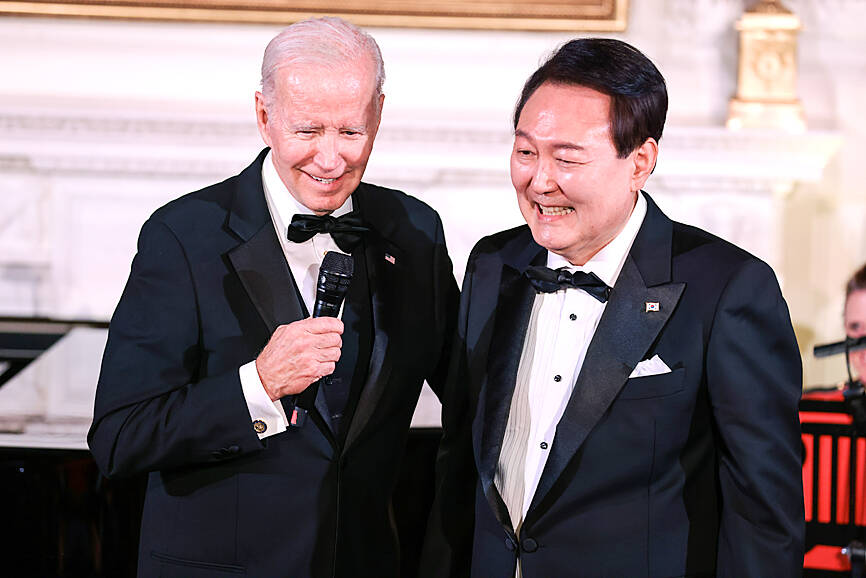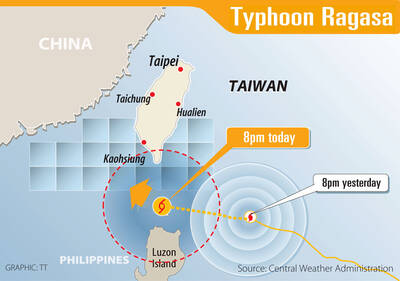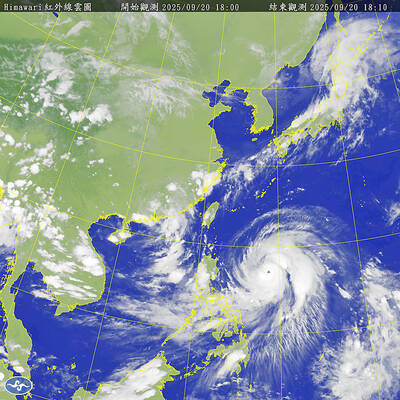US President Joe Biden and South Korean President Yoon Suk-yeol highlighted the importance of maintaining peace and stability across the Taiwan Strait in a joint statement issued after the two leaders met in Washington.
Yoon arrived in the US on Tuesday for a state visit, and met with Biden on Wednesday to commemorate the 70th anniversary of the alliance between the two nations.
Biden and Yoon “reiterated the importance of preserving peace and stability in the Taiwan Strait as an indispensable element of security and prosperity in the region,” the statement said.

Photo: EPA-EFE
The two leaders “strongly opposed any unilateral attempts to change the status quo in the Indo-Pacific, including through unlawful maritime claims, the militarization of reclaimed features and coercive activities,” it said.
The Ministry of Foreign Affairs yesterday welcomed the statement, saying that cross-strait peace and stability are the core of a safe and prosperous Indo-Pacific region.
The statement demonstrated that safeguarding the Taiwan Strait is a consensus among the democratic community and linked to key global interests, the ministry said.
Biden and Yoon also reaffirmed their commitment to preserve lawful access to the South China Sea and beyond, including unimpeded commerce and freedom of navigation, the statement said.
The two countries are set to expand cooperation in the Indo-Pacific region, singling out economic coercion as one of the issues of deep concern, it said.
The leaders oppose “harmful uses of economic influence, including economic coercion as well as use of opaque tools with respect to foreign firms,” and plan to cooperate with like-minded partners to counter the issues, it said.
The leaders vowed to work together, along with Japan, to “ensure the future of the Indo-Pacific is free, is open, prosperous and secure,” Biden said at a news conference after meeting with Yoon.
South Korea and the US are “key partners in achieving stability and building peace in the Indo-Pacific region,” and have agreed to work together to tackle regional and global challenges, Yoon said at the news conference, without directly mentioning Taiwan.
The two leaders also issued what they called the Washington Declaration to demonstrate their commitment to “develop an ever-stronger mutual defense relationship” by facilitating dialogue and information sharing, and improving joint exercises and training activities to counter growing nuclear threats faced by South Korea.

WARNING: People in coastal areas need to beware of heavy swells and strong winds, and those in mountainous areas should brace for heavy rain, the CWA said The Central Weather Administration (CWA) yesterday issued sea and land warnings for Typhoon Ragasa, forecasting that it would continue to intensify and affect the nation the most today and tomorrow. People in Hualien and Taitung counties, and mountainous areas in Yilan and Pingtung counties, should brace for damage caused by extremely heavy rain brought by the typhoon’s outer rim, as it was upgraded to a super typhoon yesterday morning, the CWA said. As of 5:30pm yesterday, the storm’s center was about 630km southeast of Oluanpi (鵝鑾鼻), Taiwan’s southernmost tip, moving northwest at 21kph, and its maximum wind speed had reached

MATAIAN RIVER: Rescue operations were ongoing, with officials urging residents to move to higher floors where possible as teams focus first on those at ground level Floodwaters from the overflowing Mataian River (馬太鞍溪) barrier lake swept into Hualien County’s Guangfu Township (光復) yesterday afternoon, leaving hundreds of people trapped and three missing as of press time last night, the Hualien County Fire Bureau said. The waters surged into downtown Guangfu after the riverbank burst at about 2:50pm, carrying mud and debris and submerging streets to rooftop level in some areas. Residents were seen climbing onto vehicles and rooftops to await rescue as thick, silt-laden water inundated the town. The surge destroyed the Mataian Bridge (馬太鞍溪橋) and flooded the Guangfu Railway Station. Rescue operations were launched with support from fire departments

The Central Weather Administration (CWA) yesterday said that it expected to issue a sea warning for Typhoon Ragasa this morning and a land warning at night as it approached Taiwan. Ragasa intensified from a tropical storm into a typhoon at 8am yesterday, the CWA said, adding that at 2pm, it was about 1,110km east-southeast of Oluanpi (鵝鑾鼻), Taiwan’s southernmost tip. The typhoon was moving northwest at 13kph, with sustained winds of up to 119kph and gusts reaching 155kph, the CWA Web site showed. Forecaster Liu Pei-teng (劉沛滕) said that Ragasa was projected to strengthen as it neared the Bashi Channel, with its 200km

PUBLIC ANNOUNCEMENTS: Hualien and Taitung counties declared today a typhoon day, while schools and offices in parts of Kaohsiung and Pingtung counties are also to close Typhoon Ragasa was forecast to hit its peak strength and come closest to Taiwan from yesterday afternoon through today, the Central Weather Administration (CWA) said. Taiwan proper could be out of the typhoon’s radius by midday and the sea warning might be lifted tonight, it added. CWA senior weather specialist Wu Wan-hua (伍婉華) said that Ragasa’s radius had reached the Hengchun Peninsula by 11am yesterday and was expected to hit Taitung County and Kaohsiung by yesterday evening. Ragasa was forecast to move to Taiwan’s southern offshore areas last night and to its southwestern offshore areas early today, she added. As of 8pm last night,